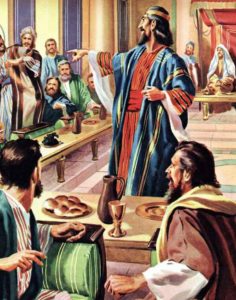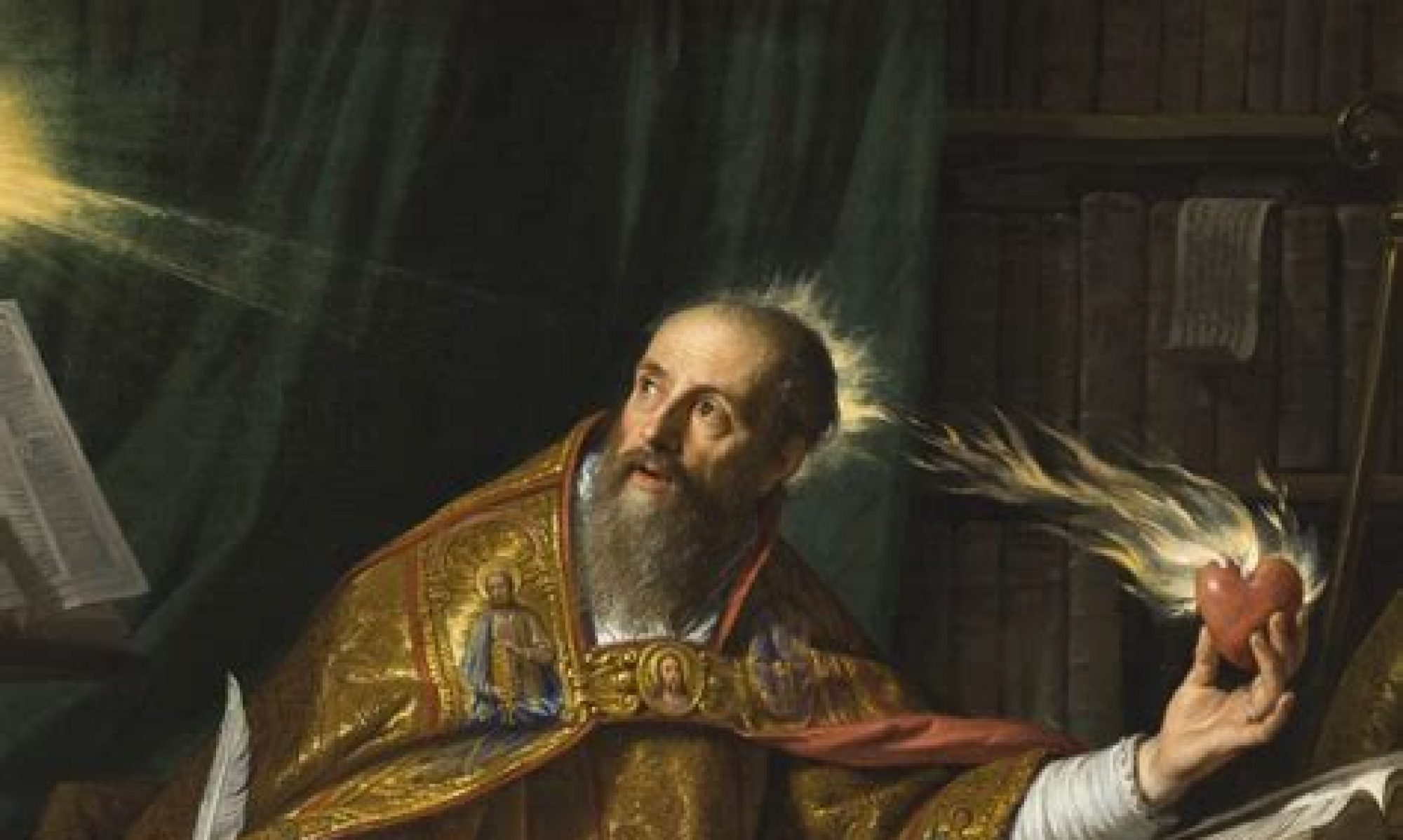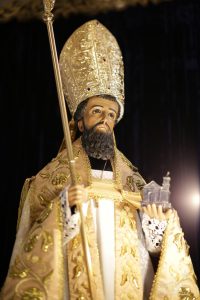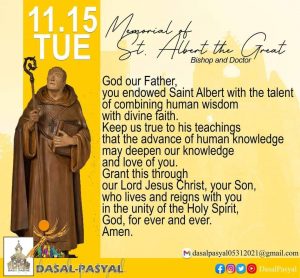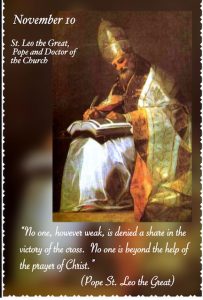- Isaiah 25:6-10
- Psalm 23:1-3, 3-4, 5, 6
- Philippians 4:12-14, 19-20
- Matthew 22:1-14 or 22:1-10
Happy Feast Day to everyone! I am happy to join Fr. Tom celebrating this mass in honor of our patroness, St. Teresa of Avila. We welcome you all. Viva St. Teresa, Viva! I believe that having happy priests means a happy parish community. Please say it, “Happy Priests, Happy Parish.”
Today, we celebrate the Feast of St. Teresa of Avila. She was a remarkable Saint and Doctor of the Church because of her holiness and writings. She reminds us of what our priority should be: She said, “The surest way to determine whether one possesses the love of God is to see whether he or she loves his or her neighbor. These two loves are never separated. Rest assured, the more you progress in love of neighbor the more your love of God will increase.” This is wonderful food for thought for us. Our belief must be anchored on the love of God and neighbors.
She was born in Avila, Spain, on March 28, 1515, to an influential and devoutly Catholic family. Known as an affectionate and friendly child, she lived what appears to have been a happy and normal childhood with a deep practice of Catholic faith. St. Teresa was educated by the Augustinian nuns; she loved to read about the lives of saints. She said, “all things of this world will pass away, and God alone is forever.” She also read the autobiography of St. Augustine, which helped her to realize that even a sinner has an opportunity to be transformed and be converted. In that light, she writes, “Let nothing frighten you. Whoever has God lacks nothing; God alone suffices.”Hence, let us always stay in an intimate relationship with Him, for all to be filled with good things. She joined the Carmelite Contemplative and reformed the monastery with the help of St. John of the Cross due to leniency of the religious life. She nurtured her spiritual life with Scriptures, reading the writings of the Fathers of the Church, and with her personal encounter of God’s mercy and of Christ being her spouse.
Many of us are so confused by what is happening to the Church today, to the extent of being critical of the Pope and the Church. We need St. Teresa today. St. Teresa was staunchly faithful to the Church during the turmoil of the Church’s reform. Instead of being critical, she dedicated her time to pray for the whole Church and for the people to be faithful and holy. She demonstrated the importance of women in the Church, not by ordination, but by being a faithful spouse of Christ, which merited a powerful witness of having a place in the Church and in Christian life today.
Today, we heard the scripture readings which invite us into the freedom Jesus can offer. In the book of Isaiah in today’s reading, the people of Israel were assured, not only of the comfort and provisions given to them, but the consolation that, “The Lord God will wipe away tears from every face.” Hence, the Prophet Isaiah offered them hope that someday Israel would be saved by God.
We have lots of struggles in life like St. Teresa. She never thought that those sufferings were punishment from God but were a way to chastise and to purify our body and soul.
The second reading speaks from the letter of St. Paul to the Philippians and reminds us that we must know “how to live in humble circumstances,” as he went through all kinds of stress and sufferings. But he reveals the effective way, that is to bear all these trials in faith. He said, “My God will fully supply….. in accord to the riches of Christ.”
Today’s gospel reading from St. Matthew tells us about another parable about the king who gave a wedding feast for his son. But his invitations were denied by many for various reasons. Let us understand salient points of this parable.
First, the King is God, and the coming of His incarnate Son, our Lord Jesus, into the world is like a great wedding feast. He is the Messiah who has the power and dominion over everything for He shares the power of God almighty.
Second, the servants in the wedding banquet are the ancient prophets who have worked for the king in order that they would be helping all the invited guests to be prepared, especially the gentiles and the sinners, for the joyous feast.
Third, among the guests is a man apparently without a wedding garment, which all the invited guests were expected to wear. Some of the experts of the scriptures commented that perhaps the wedding garment is the Baptism.
The evangelist Matthew leads us to practical application when someone invites us for a banquet or a wedding feast. We must know the nature of the party, whether it is formal, semi-formal, or casual. However, God reminds us always to live out our invitation of being serious of doing our faith. It is an acceptance of our vocation, rather than like a man without the proper attire, spiritless, uncommitted, and untroubled.
We are invited to God’s banquet, the Eucharist, and we wear the attire of goodness, love and mercy, and no one would tie us to be put in darkness for we see the goodness of the redeeming God.
St. Teresa of Avila, pray for us.
Fr. Arlon, osa
——————————
El Dictado del Corazón
Vigésimo Octavo Domingo del Tiempo Ordinario, año A
- Isaías 25:6-10
- Salmo 23:1-3, 3-4, 5, 6
- Filipenses 4:12-14, 19-20
- Mateo 22:1-14 o 22:1-10
¡Feliz día de fiesta a todos! Gracias por compartir tu platillo favorito ayer para el festival internacional. Como comunidad hispana, no somos una comunidad separada, pertenecemos a la parroquia de Santa Teresa de Ávila. En esta parroquia damos la bienvenida a todos. Ésta es la belleza de ser católicos, somos Uno y somos universales. Somos hermanos y hermanas en la fe.
Hoy celebramos la Fiesta de Santa Teresa de Ávila. Fue una una extraordinaria Santa y Doctora de la Iglesia, notable por su santidad y sus escritos. Ella nos recuerda cuál debe ser nuestra prioridad: Dijo: “La forma más segura de determinar si uno posee el amor de Dios es ver si ama a su prójimo. Estos dos amores nunca están separados. Tengan la seguridad de que el Cuanto más progresas en el amor al prójimo, más aumentará tu amor a Dios.” Esta es una maravillosa reflexión. Nuestra creencia debe estar anclada en el amor a Dios y al prójimo.
Nació en Ávila, España, el 28 de Marzo de 1515, en una familia influyente y devotamente católica. Conocida como una niña afectuosa y amigable, vivió lo que parece haber sido una infancia feliz y normal con una profunda práctica de la fe católica. Santa Teresa fue educada por las monjas agustinas; le encantaba leer sobre la vida de los santos. Ella dijo: “Todas las cosas de este mundo pasarán, y sólo Dios es para siempre”. También leyó la autobiografía de San Agustín, ayudándola a darse cuenta de que incluso un pecador tiene la oportunidad de ser transformado y convertido. En ese sentido, escribe: “No dejes que nada te asuste. Quien tiene a Dios nada le falta; Sólo Dios basta. Por lo tanto, permanezcamos siempre en una relación íntima con Él, para que todos seamos colmados de sus gracias. Se unió a la Carmelita Contemplativa y reformó el monasterio con la ayuda de San Juan de la Cruz debido a la indulgencia de la vida religiosa. Nutrió su vida espiritual en las Escrituras, la lectura de los escritos de los Padres de la Iglesia y su encuentro con la misericordia de Dios y el hecho de que Cristo sea su esposo.
Muchos de nosotros estamos tan confundidos por lo que le está sucediendo a la Iglesia hoy, hasta el punto de criticar al Papa y a la Iglesia. Necesitamos a Santa Teresa hoy. Santa Teresa fue incondicionalmente fiel a la Iglesia durante la agitación de la reforma de la Iglesia. En lugar de ser crítica, dedicó su tiempo a orar por toda la Iglesia y para que el pueblo sea fiel y santo. Demostró la importancia de la mujer en la Iglesia, no por la ordenación sino por ser esposas fieles de Cristo, que merecieron un testimonio poderoso de tener un lugar en la Iglesia y en la vida cristiana hoy.
Hoy escuchamos en las Escrituras la invitación a la libertad que solo Jesús nos puede ofrecer. En el libro de Isaías escuchamos, que al pueblo de Israel se le aseguró no sólo consuelo y provisiones, sino también el consuelo de que “el Señor Dios borrará de todo rostro”. Por lo tanto, el profeta Isaías les ofreció la esperanza de que algún día , Israel sería salvo por Dios.
Tenemos muchas luchas en la vida como Santa Teresa. Ella nunca pensó que esos sufrimientos fueran un castigo de Dios, sino una manera de purificar el cuerpo y alma.
La segunda lectura de la carta de San Pablo a los Filipenses nos recuerda que debemos saber “vivir en circunstancias humildes”, mientras él atravesaba todo tipo de tensiones y sufrimientos. Pero él revela el camino eficaz, que es soportar todas estas pruebas con fe, dijo: “Mi Dios suplirá plenamente….. conforme a las riquezas de Cristo”.
La lectura del evangelio de hoy de San Mateo nos habla de otra parábola sobre el rey que dio un banquete de bodas para su hijo. Pero sus invitaciones fueron rechazadas por muchos por diversas razones. Entendamos los puntos más destacados de esta parábola.
Primero, el Rey es Dios, la venida de Su Hijo encarnado de él, nuestro Señor Jesús al mundo es como un gran banquete de bodas. Él es el Mesías que tiene poder y dominio sobre todo porque comparte el poder de Dios todopoderoso.
En segundo lugar, los sirvientes en el banquete de bodas son los antiguos profetas que trabajaron para el rey para ayudar a todos los invitados a prepararse, especialmente a los gentiles y a los pecadores, para la gozosa fiesta.
En tercer lugar, entre los invitados, un hombre aparentemente sin el traje de boda que se esperaba que llevaran todos los invitados. Algunos de los conocedores de las escrituras comentaron que quizás, el vestido de bodas sea el Bautismo. Todos somos bautizados, por lo tanto, comportemos para ser dignos del Reino.
El evangelista Mateo nos lleva a la aplicación práctica cuando alguien nos invita a un banquete o a una fiesta de bodas. Debemos conocer la naturaleza de la fiesta si es formal, semiformal o informal. Sin embargo, Dios nos recuerda que siempre debemos vivir nuestra invitación a ser serios en cuanto a nuestra fe. Es una aceptación de nuestra vocación en lugar de ser como un hombre sin el atuendo adecuado, sin espíritu, sin compromiso y sin preocupaciones.
Estamos invitados al banquete de Dios, la Eucaristía, vestimos el traje de la bondad, del amor y de la misericordia, nadie nos atara para quedarnos en la oscuridad porque vemos la bondad del Dios redentor.
Santa Teresa de Ávila, ruega por nosotros.
P. Arlón, osa
